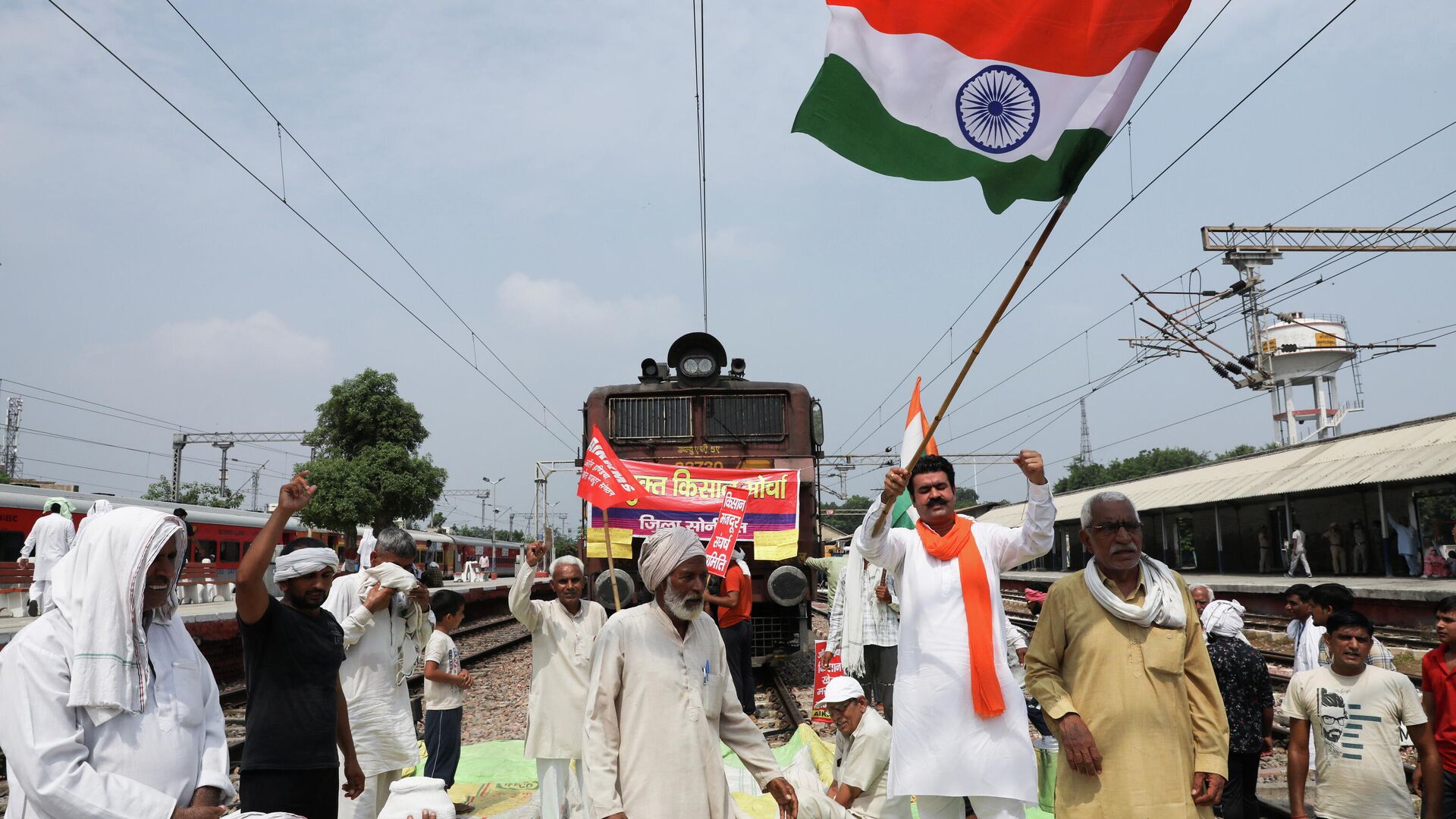https://sputnikglobe.com/20210927/india-major-highways-blocked-as-protesting-farmers-begin-nationwide-shutdown--1089435800.html
India: Major Highways Blocked as Protesting Farmers Begin Nationwide Shutdown
India: Major Highways Blocked as Protesting Farmers Begin Nationwide Shutdown
Sputnik International
Farmers on Monday called for a nationwide strike, which is impacting people's movement across the country as agitating farmers have blocked highways and rail... 27.09.2021, Sputnik International
2021-09-27T09:02+0000
2021-09-27T09:02+0000
2021-09-27T09:02+0000
new delhi
delhi
farmer
world
protest
https://cdn1.img.sputnikglobe.com/img/07e5/09/1b/1089438862_0:160:3073:1888_1920x0_80_0_0_f9079cb10c69fee7d2776947c5e3e66e.jpg
Protesting Indian farmers on Monday called for 'Bharat Bandh' — a nationwide shutdown, due to three contentious farm laws which were approved by the Indian parliament last September.The pan-India blockade has been called to mark one year since the passing of farm laws by the Narendra Modi-led-federal government.Images and videos of farmers blocking railway tracks and highways in states like Punjab, Rajasthan, Orissa, Uttar Pradesh, and many other states have also emerged online.The All India Bank Officers' Confederation and the All India Centre of Trade Unions (AICTU) have also extended their support to the protests.Indian opposition parties, including the Congress party, Trinamool Congress (TMC), Aam Aadmi Party (AAP), Dravida Munnetra Kazhagam (DMK), and Communist Party of India (CPI) are supporting the nationwide protests.Similarly, non-Bharatiya Janata Party (BJP) ruled state governments, including those in Punjab, Kerala, Andhra Pradesh and Tamil Nadu, have declared complete support for the nationwide strike.This is the third nationwide strike to be announced by farmers; the first was observed in December 2020, while the second such protest was in March 2021. Last year, tens of thousands of farmers, mainly from North Indian states, started protesting soon after the federal government passed the three farm laws. When the Modi government remained adamant and refused to scrap the liberalisation laws, farmers trudged towards New Delhi in November 2020. Stopped by authorities at Delhi's border, farmers camped on the national capital's border and have been protesting there ever since. This has also been the longest-running farmers' protest against the government in the country's history. According to the farmers, the new laws will end the minimum support price (MSP)— a government-set guaranteed price for farmers' produce. The law will also pave the way for industrialists to enter into the farming system; growers fear that they will be left at the mercy of big agribusiness in the future, leading to a deterioration in their condition. The two new farm bills and one amendment that have stirred the controversy are the Farmers (Empowerment and Protection) Agreement of Price Assurance and Farm Services Act, 2020, Farmers Produce Trade and Commerce (Promotion and Facilitation) Act, 2020, and the Essential Commodities (Amendment) Act 2020.
new delhi
delhi
Sputnik International
feedback@sputniknews.com
+74956456601
MIA „Rosiya Segodnya“
2021
Deexa Khanduri
https://cdn1.img.sputnikglobe.com/img/07e4/0c/1e/1081607388_0:0:961:960_100x100_80_0_0_e9e931b8c1e18fb41f3074e2145d7a3a.jpg
Deexa Khanduri
https://cdn1.img.sputnikglobe.com/img/07e4/0c/1e/1081607388_0:0:961:960_100x100_80_0_0_e9e931b8c1e18fb41f3074e2145d7a3a.jpg
News
en_EN
Sputnik International
feedback@sputniknews.com
+74956456601
MIA „Rosiya Segodnya“
Sputnik International
feedback@sputniknews.com
+74956456601
MIA „Rosiya Segodnya“
Deexa Khanduri
https://cdn1.img.sputnikglobe.com/img/07e4/0c/1e/1081607388_0:0:961:960_100x100_80_0_0_e9e931b8c1e18fb41f3074e2145d7a3a.jpg
new delhi, delhi, farmer, protest
new delhi, delhi, farmer, protest
India: Major Highways Blocked as Protesting Farmers Begin Nationwide Shutdown
Deexa Khanduri
Sputnik correspondent
Farmers on Monday called for a nationwide strike, which is impacting people's movement across the country as agitating farmers have blocked highways and rail networks. As a precautionary measure, state governments have directed educational institutions to suspend operations for the day.
Protesting Indian farmers on Monday called for 'Bharat Bandh' — a nationwide shutdown, due to three contentious farm laws which were approved by the
Indian parliament last September.
The pan-India blockade has been called to mark one year since the passing of farm laws by the Narendra Modi-led-federal government.
"All government offices, businesses and educational institutions as well as rail and road traffic will be non-operational. However, essential services will remain unaffected," Harinder Singh, part of the media team covering the farmers' protest, told Sputnik.
Images and videos of farmers blocking railway tracks and highways in states like Punjab, Rajasthan, Orissa, Uttar Pradesh, and many other states have also emerged online.
The All India Bank Officers' Confederation and the All India Centre of Trade Unions (AICTU) have also extended their support to the protests.
"The Modi government has turned a blind eye towards the farmers, who have been protesting for ten months. About 600 farmers have died in this agitation, but the government still insists on not talking about the farm laws," Singh added.
Indian
opposition parties, including the Congress party, Trinamool Congress (TMC), Aam Aadmi Party (AAP), Dravida Munnetra Kazhagam (DMK), and Communist Party of India (CPI) are supporting the nationwide protests.
Similarly, non-Bharatiya Janata Party (BJP) ruled state governments, including those in Punjab, Kerala, Andhra Pradesh and Tamil Nadu, have declared complete support for the nationwide strike.
This is the third nationwide strike to be announced by farmers; the first was observed in December 2020, while the second such protest was in March 2021. Last year, tens of thousands of farmers, mainly from North Indian states, started protesting soon after the federal government passed the three farm laws.
When the Modi government remained adamant and refused to scrap the liberalisation laws, farmers trudged towards New Delhi in November 2020. Stopped by authorities at Delhi's border, farmers camped on the national capital's border and have been protesting there ever since. This has also been the longest-running farmers' protest against the government in the country's history.
According to the farmers, the new laws will end the minimum support price (MSP)— a government-set guaranteed price for farmers' produce. The law will also pave the way for industrialists to enter into the farming system; growers fear that they will be left at the mercy of big agribusiness in the future, leading to a deterioration in
their condition.
The two new farm bills and one amendment that have stirred the controversy are the Farmers (Empowerment and Protection) Agreement of Price Assurance and Farm Services Act, 2020, Farmers Produce Trade and Commerce (Promotion and Facilitation) Act, 2020, and the Essential Commodities (Amendment) Act 2020.





